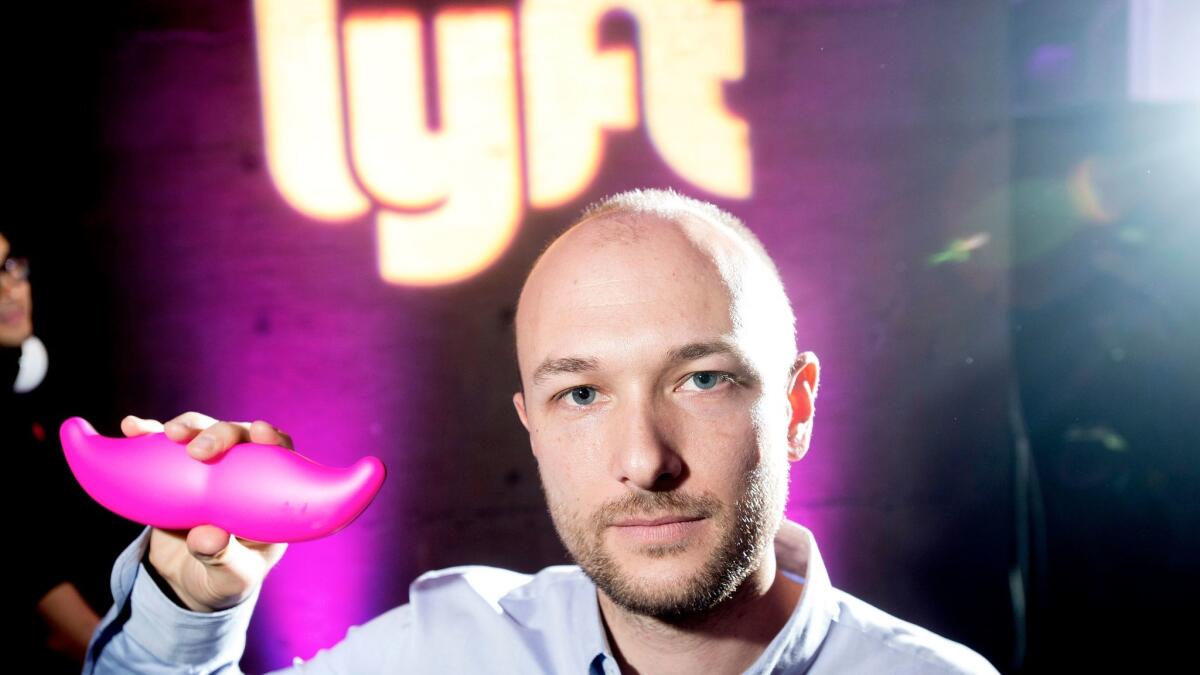Op-Ed: Lyft Shuttle: Another Silicon Valley effort to shelter the well-off from those pesky poor people

- Share via
Here’s a modern-day startup riddle: When is a bus not really a bus?
The ride-hailing company Lyft rolled out its new shuttle service this week, allowing users in San Francisco and Chicago to “ride for a low fixed fare along convenient routes, with no surprise stops.” Some were quick to identify this supposed innovation as a bus, and they seized the opportunity to mock tech-world myopia. “Coming soon, Lyft Open: It only has two wheels, no doors, and you power it with your feet,” tweeted TV host Samantha Bee. A cascade of jokes followed about the various wheels that Lyft could reinvent next.
Others, such as Slate’s Will Oremus, insisted Lyft Shuttle is not a bus — which is precisely what makes it dangerous. It’s “a service that is likely to compete with city buses, for better or worse,” he wrote, which means it poses a threat to public transit and the people who rely on it by siphoning off the most affluent riders.
According to Pew Research Center data, “Americans who are lower-income, black or Hispanic, immigrants or under 50 are especially likely to use public transportation on a regular basis.” Meanwhile ride-hailing apps, reports Pew, are especially popular among college grads with incomes above $75,000 a year. You don’t need a route map to see where this is going.
Am I taking a Lyft because the public-transit options suck? Or do the public-transit options suck because people like me are always taking Lyft?
Lyft, for its part, has carefully avoided the word “bus.” But whatever we call it, Lyft Shuttle is just another way that wealthier Americans are paying for reliable and convenient services rather than demanding improvements to existing public goods.
Services like Lyft are also giving customers the ability to live insulated from those who have less money. That’s a time-honored tradition. To take just a few examples:
The Los Angeles Country Club: A park without poor people. Do you love to socialize outdoors but shudder at the thought of a less-than-pristine restroom situation, a raucous barbecue nearby, or a germy drinking fountain? Try this innovative, membership-based solution.
Carbon Beach: A beach without poor people. Ok, so technically it’s a public beach, but with confusing signage and a hostile attitude toward strangers who happen to venture onto the sand, it’s effectively private. Sunbathe without ever having to worry about bumping into a weird old stoner dude or a picnicking family again!
Postmates: Meals on Wheels without poor people. Sure, you are physically and financially able to go to the grocery store, but your time is valuable. Just get dinner delivered, plate it at home, and it’s almost like you’ve got a private chef. You’ll never have to cross paths with someone using food stamps again! If you’re a real DIY type, try a meal-kit service like Blue Apron for a similar effect.
Private jets: Air travel without poor people. Sick of sneezing seatmates and crammed overhead bins? Hate the looks that fellow travelers give you as they file back to economy class, where they’ve paid $60 for an additional four inches of legroom? There’s a better way!
Even if most ride-hailing customers aren’t at risk of joining the private-jet set and still take public transit from time to time (which research suggests they do — for now), the impulse to hail a Lyft Shuttle rather than the city bus is rooted at least partly in a desire not to occupy the same spaces as people with fewer resources, no access to healthcare, little income. That’s an impulse we need to fight, not encourage. Because once the relatively wealthy stop using a service, it tends to be seen as a budgetary drain rather than a collective investment.
Who cares if Lyft Shuttle calls itself a bus or not? The real riddle each of us needs to solve is this: Am I taking a Lyft because the public-transit options suck? Or do the public-transit options suck because people like me are always taking Lyft?
Ann Friedman is a contributing writer to Opinion. She lives in Los Angeles.
Follow the Opinion section on Twitter @latimesopinion or Facebook
More to Read
A cure for the common opinion
Get thought-provoking perspectives with our weekly newsletter.
You may occasionally receive promotional content from the Los Angeles Times.









